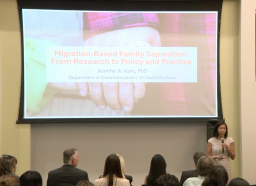Mission
Our research collaborative includes faculty, graduate students, and undergraduate students who are interested in communication, migration, and reducing inequities. Guided by a social ecological model, we use quantitative and qualitative methods to examine how stressors, rooted in structural barriers, are associated with the health and wellbeing of migrant youth and their families. We focus on undocumented immigration, migration-based family separation, interpreting for adult family members under stressful conditions, and racial/ethnic discrimination. In addition, we conduct research that identifies promotive factors at different levels (e.g., individual, interpersonal, community, institutional, cultural, state, and federal) to reduce inequities and promote thriving.







